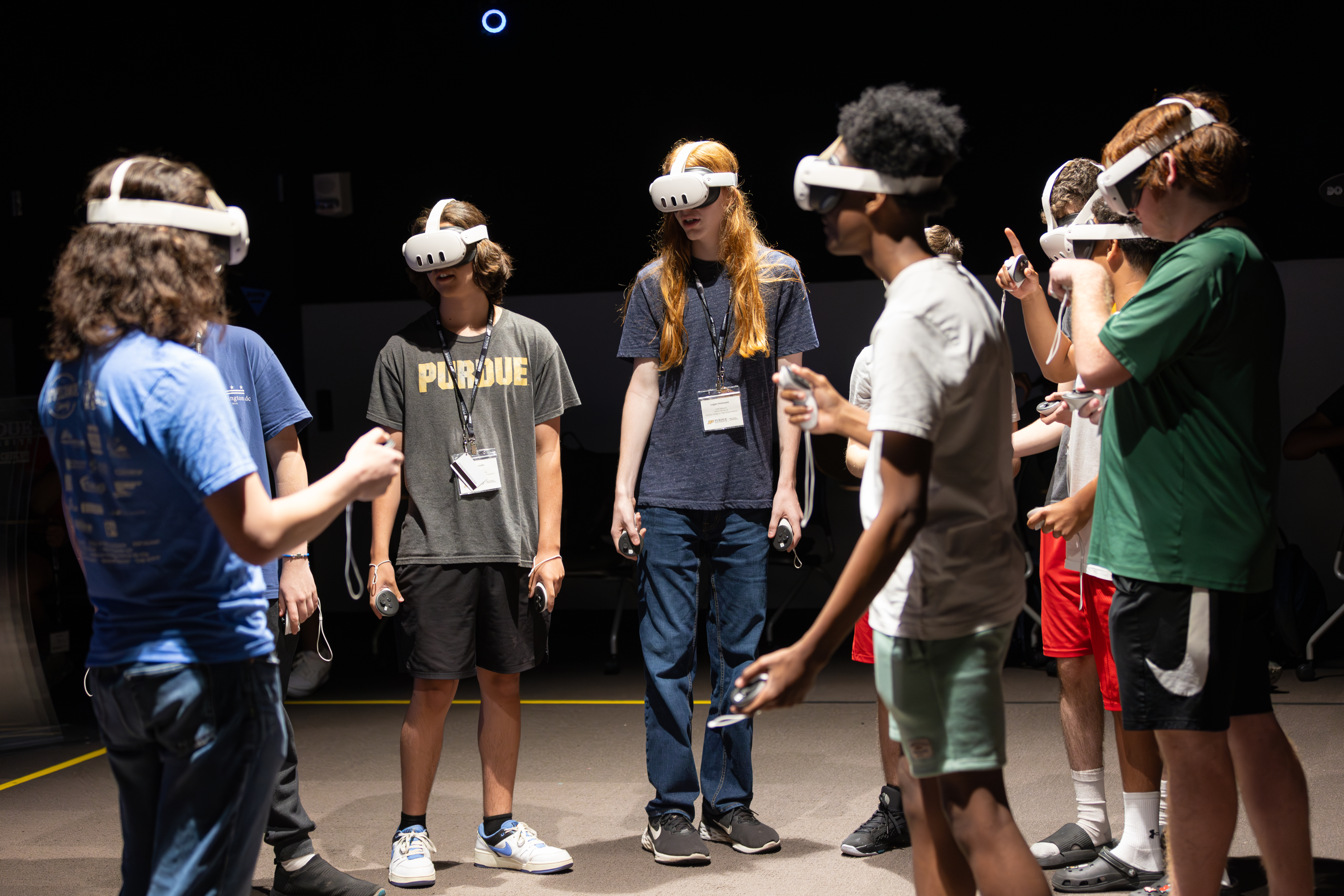RCAC hosts successful summer camps related to cybersecurity, coding
The Rosen Center for Advanced Computing (RCAC) recently hosted two summer camps aimed at high schoolers, with the hopes of giving them an introduction into the college experience by providing them the ability to earn college credit, explore potential majors and experience campus life.
The first camp, CyberSafe Heroes: A Week of Cybersecurity Mastery, focused on cybersecurity best practices and career pathways. Students participated in encryption challenges, ethical hacking simulations, cybersecurity escape rooms, online safety workshops, and engaging career panels with cybersecurity professionals.
The second camp, Code Explorers: Coding and Environmental Discovery, focused on creating an immersive introduction to coding, connecting it to environmental science. Students were able to code with microcontrollers, conduct data analysis with Python, create environmentally themed games and more.
Both camps were lauded as great successes by both students and staff members alike, bringing together a diverse and vibrant community of enthusiastic students and dedicated volunteers in order to create an atmosphere of excitement and learning. The meticulously planned activities and smooth execution ensured every participant had a memorable and enriching experience.

"I had an incredible time at Purdue University’s CyberSafe camp,” says camper Kanishk Thamman. “I explored cybersecurity topics like password cracking and also used Purdue CyberTap’s cyber range to conduct a scavenger hunt! For my final project, I presented on AI's impact on cybersecurity, showcasing my passion to peers and mentors. I'm excited for more opportunities like this in the future."
Thamman, a rising junior, plans to double major in cybersecurity and AI at college. After high school, he plans to continue research regarding the impact AI has on cybersecurity and how it can be integrated together safely to protect against cyber-attacks.
The students of both camps had transformative experiences. They dived into engaging activities that blended fun with learning. Many students also discovered new interests and talents, built lasting friendships and gained a newfound sense of confidence. They thrived in hands-on projects and team-building exercises, challenging them to think creatively and work collaboratively.
The RCAC volunteers found the camp to be a deeply rewarding and fulfilling experience. They enjoyed having the opportunity to mentor and guide students, witnessing their growth firsthand. They also picked up on the enthusiasm of the participants. Many volunteers spoke of the profound satisfaction they felt in contributing to the students' development. The camp also allowed them to hone their own skills in leadership, communication, and teamwork, making it a mutually beneficial experience.
“In the nearly 25 years of my professional career, the RCAC summer camps have been the most work-related fun I've ever had,” commented RCAC staff member Charlie Fultz, who served as one of the volunteers at the CyberSafe camp.
“It was great interacting with the students. At first, when I met them, and heard about what they knew already and the certifications some of them had, I was worried that they'd destroy my demo/exercise, and have it completed in no time at all. I was delighted to see that not one of them had really ever tried to "break into" a computer. Most of them hadn't even seen the inside of a computer, let alone actually touch and poke around in one."
George Bailey, director of Purdue CyberTap (Purdue’s technical assistance program for cybersecurity services and education) and one of the instructors of the CyberSafe camp also noted: “I feel it is the responsibility of all cybersecurity professionals to promote safe and secure computing practices among the next generation. Volunteering in RCAC's Cybersafety Hero's Camp isn't just teaching how to protect data; it's about empowering the next wave of the workforce with the knowledge and skills to safeguard our digital world. The group of students that participated are up to the challenge and they came to camp each day prepared to learn and engage with each other. I’m already excited for next year's camp!”
Plans are already underway to make these camps annual events. The undeniable enthusiasm and joy it brought to both students and volunteers has energized the organizers to take it to the next level. Future iterations will build on this year's success, introducing new and exciting activities that will continue to inspire and engage participants.
RCAC thanks the following volunteers, who generously contributed their time and made the camps possible: George Takahashi, Luke Monroe, Charles Fultz, George Bailey, Michael Nelson, Geoffrey R. Lentner, Taylor Graham, Justin Daniel Gillingham, Katy Gunderson, Jonathan Poole, Laura Theademan and Manasa Vemuri (graduate student at RCAC).
Additionally, RCAC thanks Dameion Brown (chief information security officer at Jackson State University), Smriti Bhatt (assistant professorof cybersecurity in computer and information technology) and Jin Kocsis (associate professor of cybersecurity in computer and information technology).
RCAC would also like to especially thank computer science instructional specialist Nicholas S. Brasovan, instructional specialist in the department of computer science, and Suzanna Gardner, RCAC’s senior research operations administrator for outreach and engagement, who directed the camps.
To learn more about RCAC and future educational opportunities, contact rcac-help@purdue.edu.
